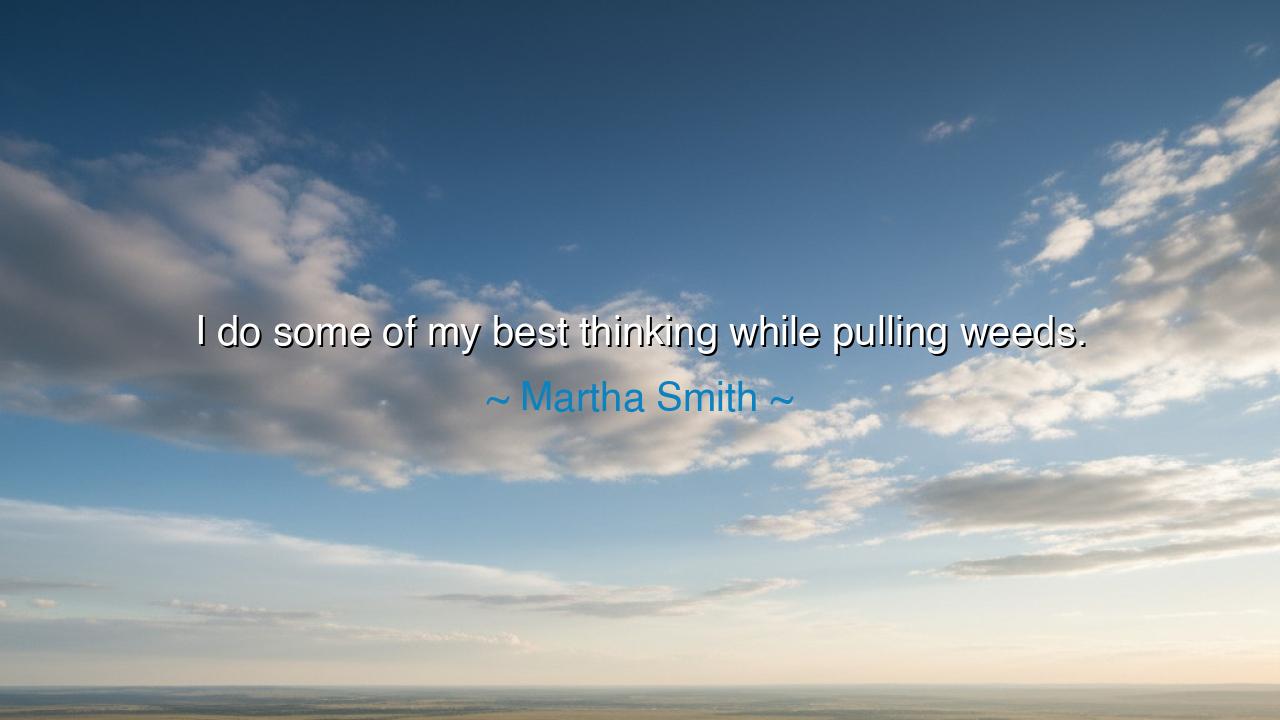
I do some of my best thinking while pulling weeds.






The soft hum of the café surrounded Jack and Jeeny, the rhythmic tapping of rain against the window blending with the low murmur of conversation. Jack sat across from Jeeny, his coffee cup cradled in his hands, staring out at the rain-soaked streets. Jeeny, sitting opposite him, seemed lost in thought, her fingers tracing the rim of her cup.
Host: After a moment of quiet, Jeeny spoke, her voice reflective, but with a hint of warmth.
Jeeny: “I came across a quote today from Martha Smith that I really liked. She said, ‘I do some of my best thinking while pulling weeds.’ What do you think about that? Do you think there’s something to be said for the quiet, repetitive tasks that allow your mind to wander and think?”
Jack: He looked up, a small smile playing at the corner of his mouth. “I love that. It’s funny how often our best ideas come not when we’re sitting down, trying to think, but when we’re engaged in something simple and physical—like pulling weeds, walking, or even just washing dishes. Our minds can go into overdrive when there’s no pressure to perform or focus. Sometimes, those mundane tasks create the perfect space for reflection.”
Jeeny: “Exactly! It’s almost like those simple tasks give our minds room to breathe. We’re not distracted by the constant demands of the world, and in that quiet, repetitive space, thoughts can come to the surface that we might not have noticed otherwise. It’s like the body is doing something, but the mind is free to wander and process in the background. I think there’s real creativity in that kind of stillness.”
Host: The rain outside had softened, and a quiet stillness had settled in the café. Jack shifted slightly, his fingers still resting on his coffee cup as he continued.
Jack: “It’s a kind of mindfulness, isn’t it? You’re focused enough on the task to give your mind something to do, but not so much that it demands your full attention. In that space, you can make connections between thoughts and ideas that you might have missed in the busyness of life. Sometimes, the most profound insights come when you’re not trying to force them—they come naturally, when the mind is at ease.”
Jeeny: “Yes, it’s like a balance between action and stillness. You’re not actively searching for answers, but you’re creating the right conditions for them to emerge. That’s why so many creative people talk about how they get their best ideas when they’re doing something unrelated to their work—like walking or cleaning. It’s in those moments that you’re able to let go of the pressure and just let your mind flow.”
Host: The conversation seemed to deepen, as they both reflected on the power of simplicity. Jack set his coffee cup down gently, his expression softening.
Jack: “It’s a reminder that creativity isn’t always something you can force. Sometimes, the best thinking happens when you give your mind the freedom to wander. Simple tasks, like pulling weeds, walking, or even just sitting quietly, can open up space for ideas to bubble up organically. It’s about making space for your mind to connect the dots.”
Jeeny: Her smile was small but filled with understanding. “Exactly. It’s like we’re letting go of the need to control everything. When we stop trying so hard, we give our minds permission to be open and let creativity flow naturally. Maybe that’s the secret to thinking well—to stop overthinking and just let the mind do its work when it’s ready.”
Host: The rain had stopped, leaving a quiet calm in the air. Inside, Jack and Jeeny sat in the realization that some of the best ideas and insights don’t come when we’re pushing for them—they come when we give ourselves permission to let our minds wander. Martha Smith’s words remind us that sometimes the best thinking happens when we’re not focused on thinking at all. It’s in the quiet, simple moments of life that the most profound insights often find their way to the surface.






AAdministratorAdministrator
Welcome, honored guests. Please leave a comment, we will respond soon